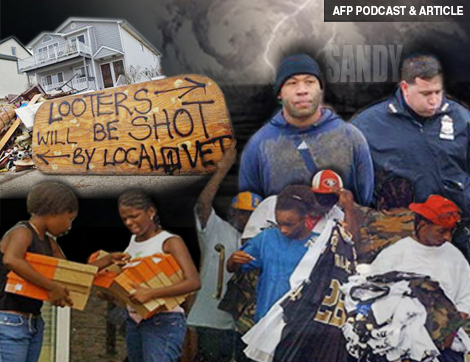
AFP AUDIO INTERVIEW
Hurricane Sandy brought a big chunk of Manhattan to its knees, and as the Big Apple lay vulnerable, the looting began.
Immediately after the shock wave of water, local gangs, some organized via the Internet, began the wholesale looting of homes and firing on police. Local residents charge that police withdrew or held their positions leaving many blocks vulnerable for hours to looters. Looters were deterred, however, at many locations by groups of neighbors who quickly banded together armed with everything from ax-handles and knives to shotguns and rifles.
Jeff Smith, a correspondent for AMERICAN FREE PRESS’s Eastern Bureau and a native New Yorker, discusses the looting, Mayor Bloomberg’s response to the disaster, the altered make-up of New York City, and what the hurricane revealed about Manhattan, in this enlightening interview (29:50)
Dave Gahary, a former submariner in the U.S. Navy, is the host of AFP’s ‘Underground Interview’ series.
Be sure to check out all of AFP’s free audio interviews. You’ll find them on the HOME PAGE, in the ARCHIVES & in the AUDIO section.
Hurricane Sandy’s Untold Story of Looting, Violence, Resistance
By Jeffrey Smith
NEW YORK CITY—The mega-storm, which ravaged and blacked-out New York City as well as parts of New Jersey, Connecticut and Rhode Island, destroyed hundreds of homes and left tens of thousands of families homeless. But there is an equally significant story that is not getting the attention it deserves from the mainstream press, and that is the wave of violent crime and looting that is sweeping major metropolitan areas.
Manhattan’s lower end, the Battery, was swamped by a storm tide sending tens of thousands of gallons of water into local subway tunnels and into the Battery Tunnel, which leads to Brooklyn. The Battery Tunnel’s flooding led to fears that the tunnel’s structural integrity has been compromised. Other areas of Manhattan were flooded often to a depth of over five feet or more. The damage to the area is estimated to be in the tens of millions of dollars.
But while the tunnels, subways and streets were overwhelmed, one major lower Manhattan landmark not affected was the headquarters of Goldman Sachs, which used what was reported to be 25K sandbags to secure their property. CEO Lloyd Blankfein’s tower at 200 Water Street remained a brightly illuminated tower in an otherwise soaked and blacked-out landscape. Reporters later said that Occupy Wall Street members picketed Blankfein’s midtown apartment in an area which was most certainly not flooded.
Making things far worse for New York City, immediately after the shock wave of water, local gangs, some organized via the Internet, began wholesale looting of homes, firing on police.
Local residents charge that police withdrew or held their positions leaving many blocks vulnerable for hours to looters. Looters were deterred, however, at many locations by groups of neighbors who quickly banded together armed with everything from ax-handles and knives to shotguns and rifles.
Famed Guitarist Simon Chardiet’s family has a home in the Rockaway section of Queens, which he said he protected through the long night. He confirmed both the horrific conditions of the flood itself and the amount of violent crime, which swiftly followed the waters.
Immediately after the storm surge, gangs of looters ran through parts of Coney Island shouting for others to concentrate on plasma TVs as they were considered to have the most street value. Large areas of Queens were plagued by gangs and in Staten Island residents quickly erected spray painted signs warning looters that they would be shot.
One of the almost immediate effects of the storm was that food in many areas became a real problem. Many key items ran out quickly. On Manhattan’s Lower East Side and elsewhere, for example, mobs began removing recently thrown-out food from dumpsters.
In this and other regards the entire range of events in New York appeared to strongly confirm what scores of patriotic organizations and leaders have warned over the last 50 years—that the national infrastructure and especially the food supply has become dangerously undermined.
Jeff Smith is a correspondent for AFP’s Eastern Bureau.

